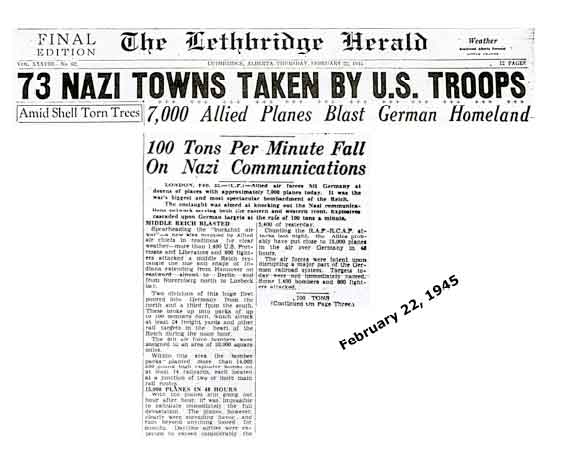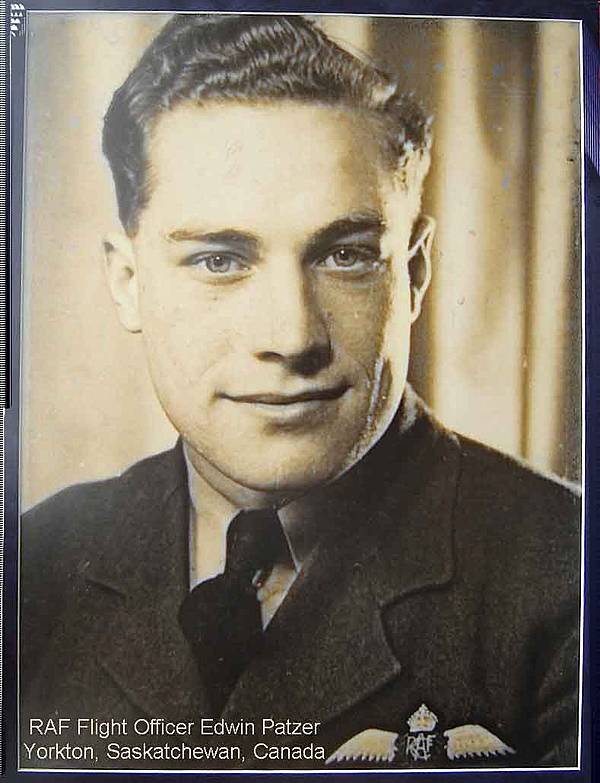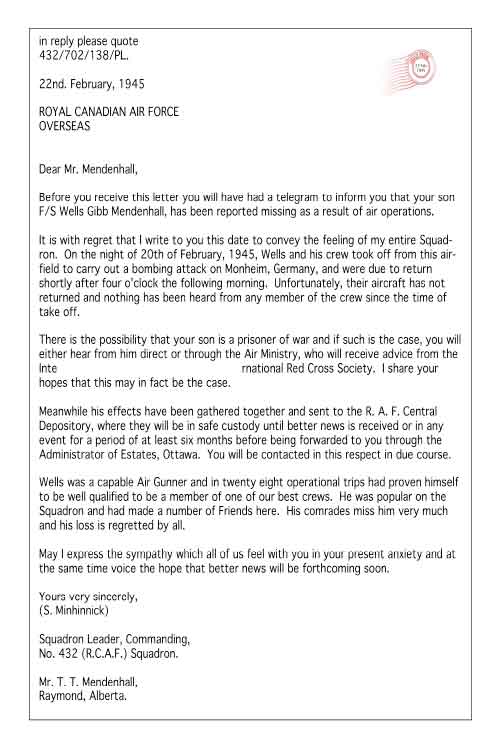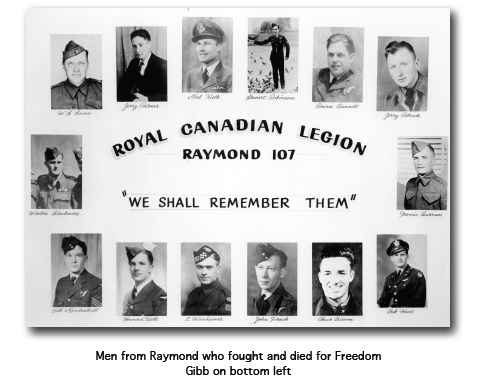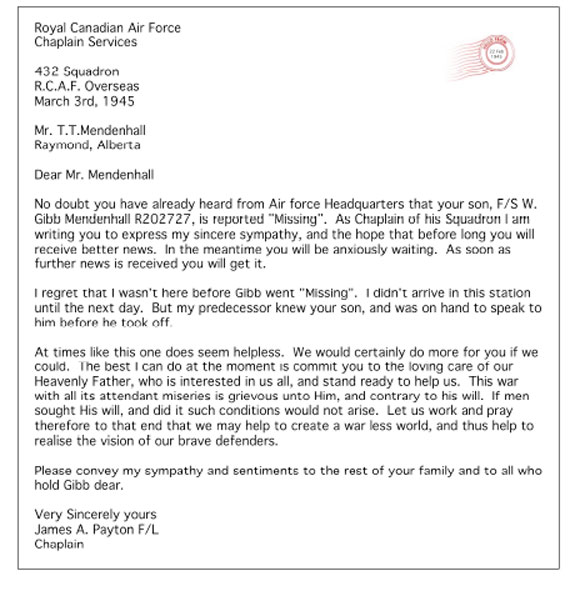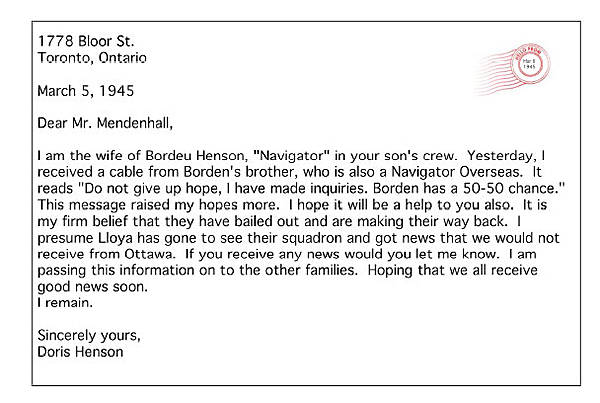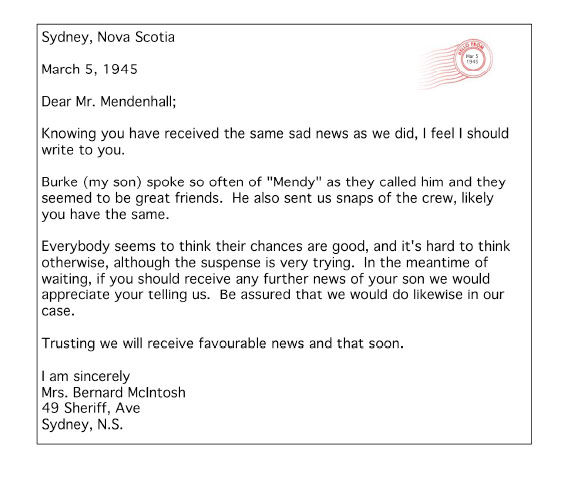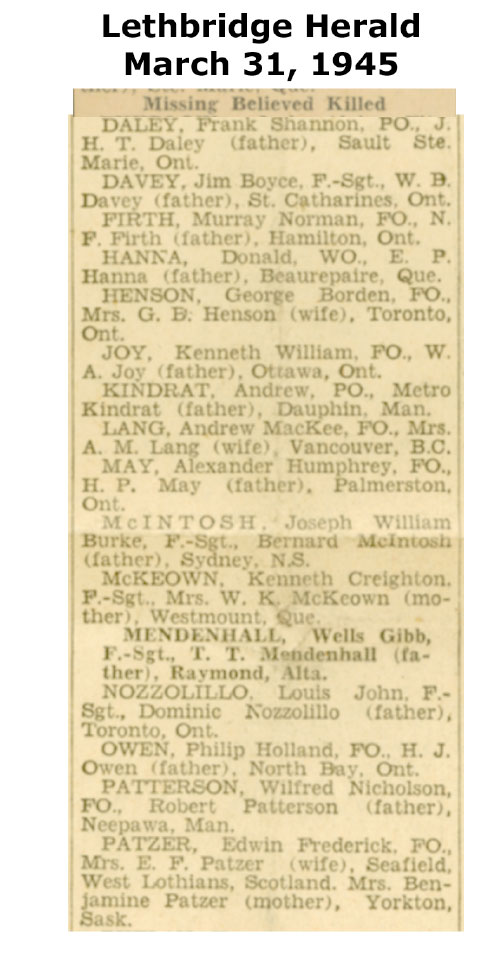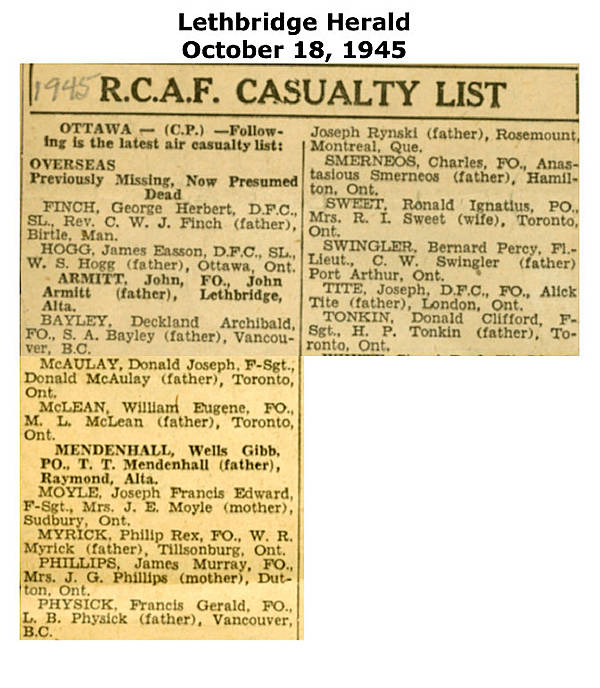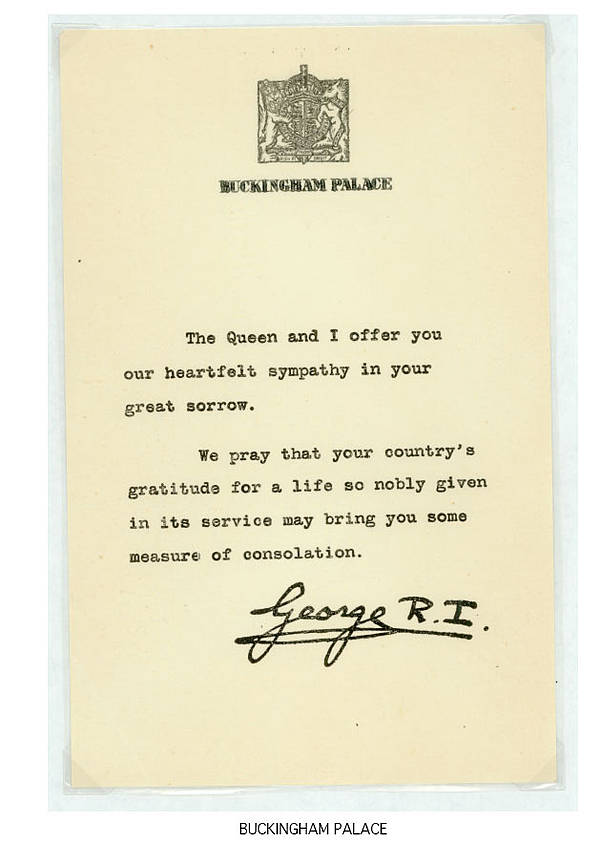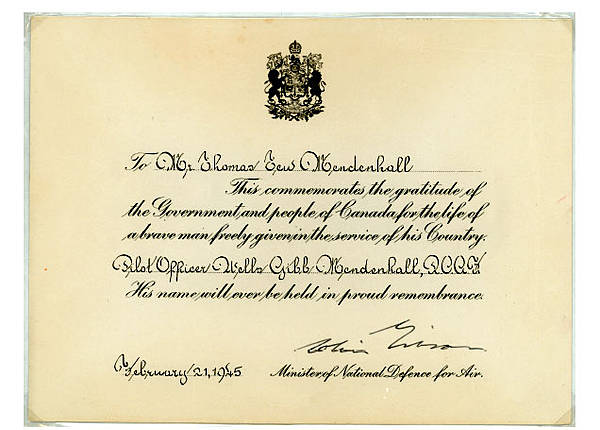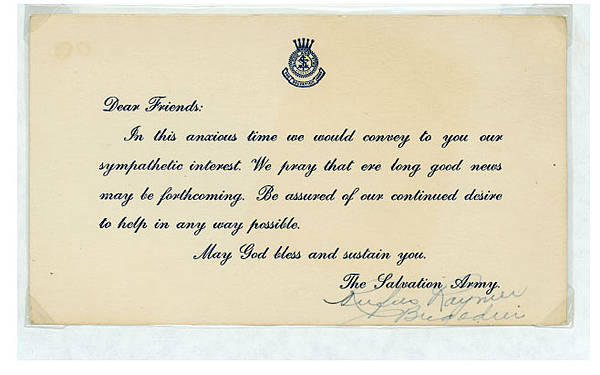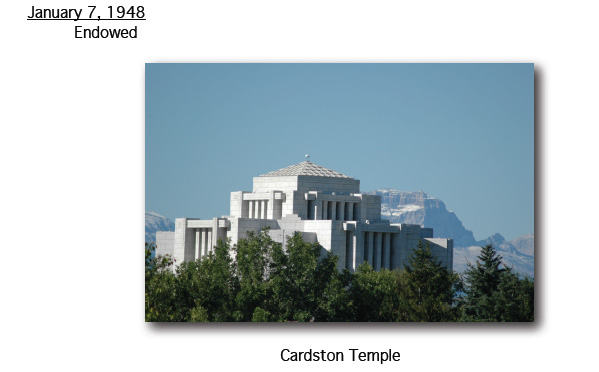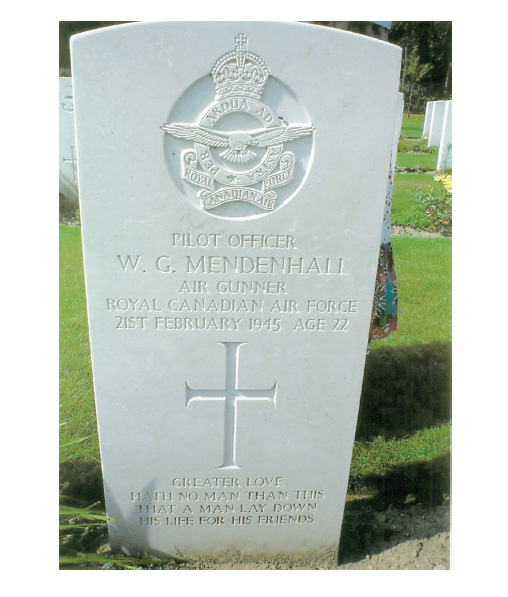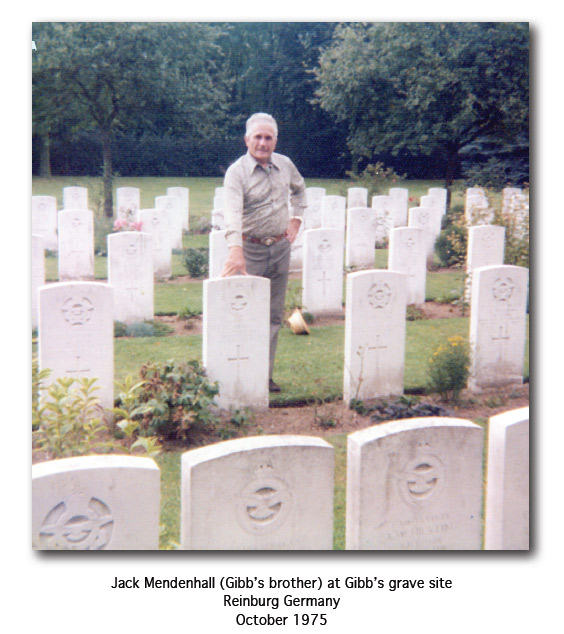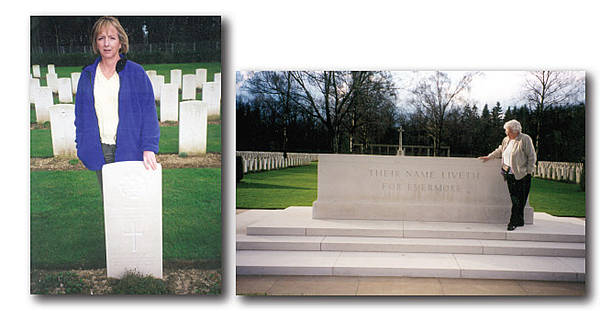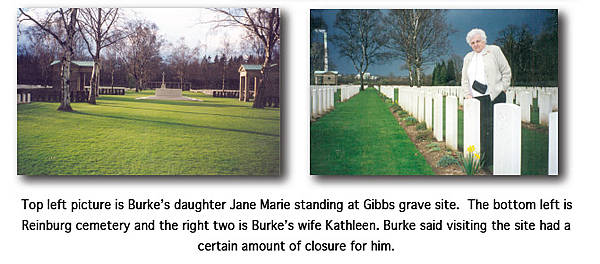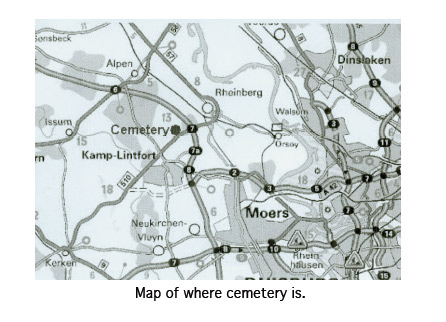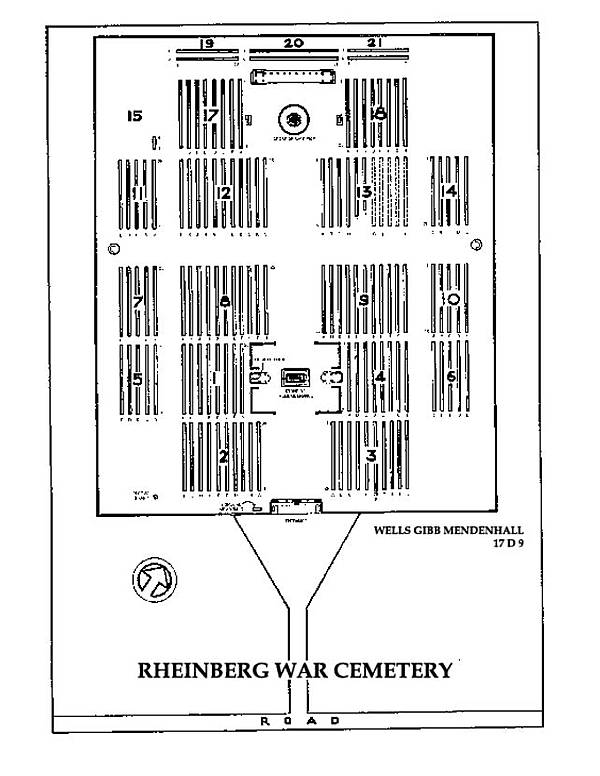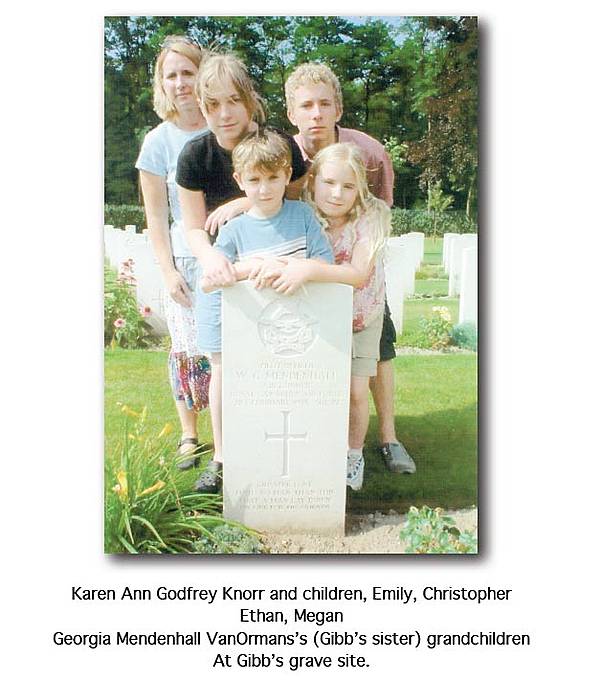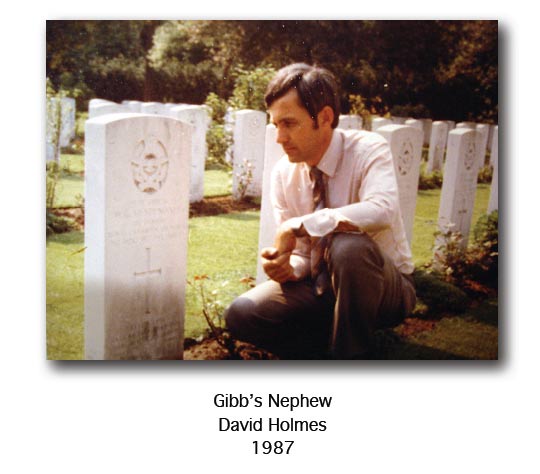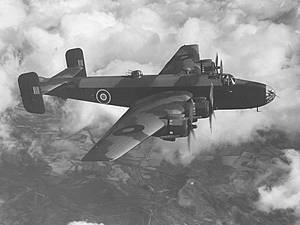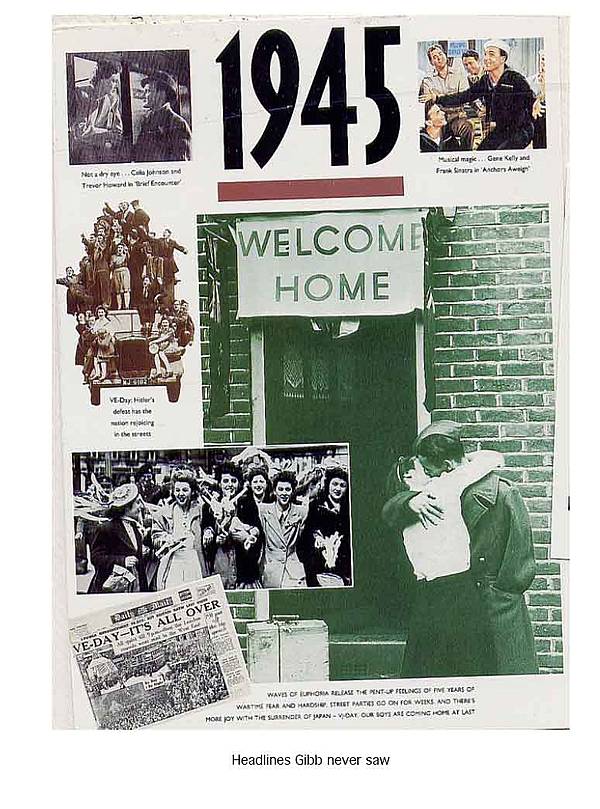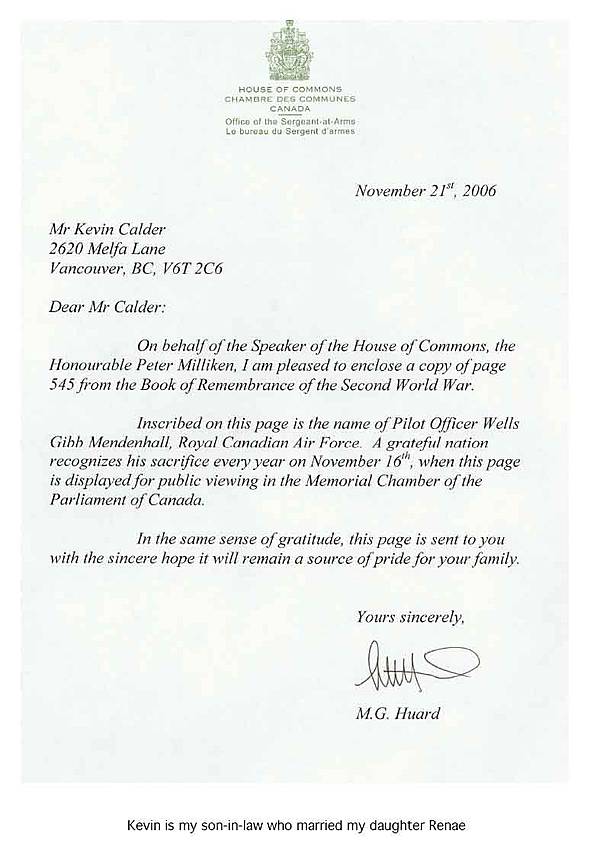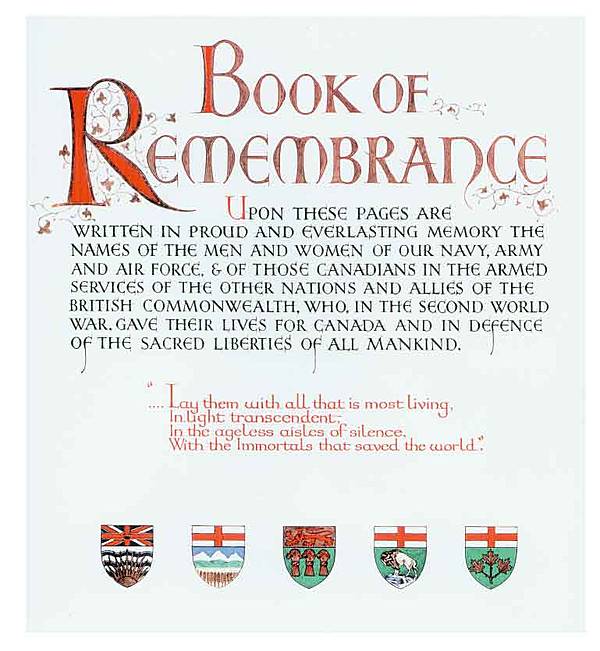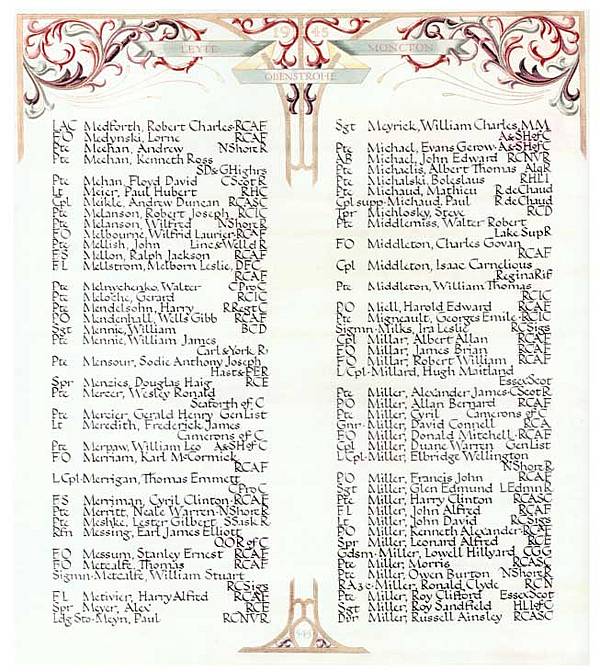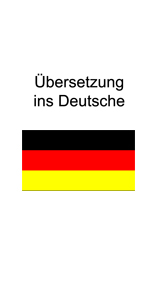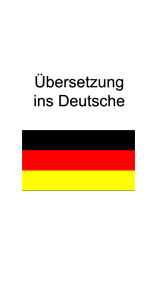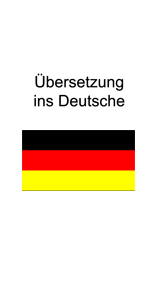August 29, 1946
Investigation of the crash site produced little evidence of identity for each crew
member.
September 3 1948
Herr Brugger, who was the chief witness of the crash, later informed the RCAF
that earlier this year (1946) while he was clearing the wreckage from his garden, he
discovered parts of a human body, partly carbonized, a silver ring bearing the initials G.M. was found on one of the fingers, this could refer to Flight Sergeant Mendenhall, W.G. The remains of this body were put into a wooden box and buried in the same grave as the other two airmen.
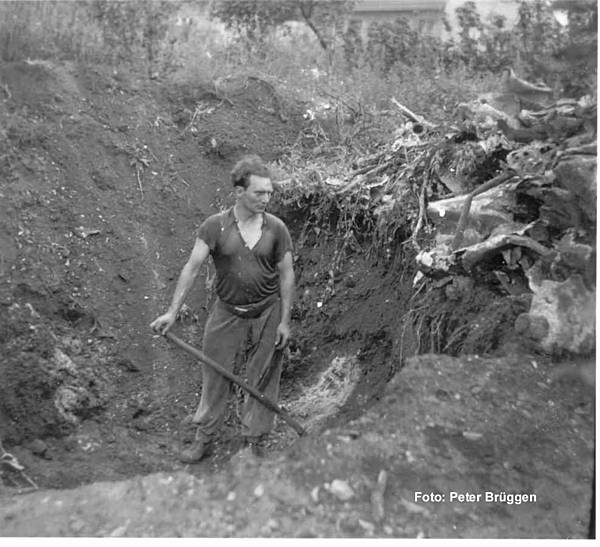
Peter Bruggen digging in his back yard.
According to further reports, the remains of Patzer and Grant were buried
without coffins, at an earlier date.
This information may enable Flight Lieutenant Hirth to recommend an individual grave for J93949 Pilot Officer W.G Mendenhall, if not, then collective registration will be acceptable for graves 9 to 11 row A, Plot XVII in the Rheinberg Cemetery for the three airmen concerned.
August 2, 1945
Letter from overseas with statements of May, Hensen, Daley and McIntosh,
released from prison.
February 21, 1992
As a memorial or recognition of the sacrifice Gibb made, Jack, Gibb’s oldest
brother, jumped from an airplane and did some free falling. He said it was great. He
was 80 years old at the time and had no other experience prior to this.
In 2002 Burke McIntosh along with some of his family visited the grave site of
three members of his crew, Gibb Mendenhall, Patzer, Grant.
Hand written letter received from Kay MacIntosh. January 17th, 2007
Thom
I have a bad quiver in my hand so excuse the squiggles.
Burke does not know I am sending this speech he made to a group of young air cadets. He wasn’t even for giving copies to our children. “It isn’t good enough”! So don’t try to put it in the “New York Times”.
I did make copies for the kids anyway. I thought since they (Burke & Gibb) flew in the same plane they would have had the same experiences except for prison camp.
Secret Agent- Kay
SPEECH
by Burke MacIntosh
Given to 60 Air Cadets
2004
Special guests
I think it was Winston Churchill who said men of the army and navy and
gentlemen of the air force. In this case its ladies and gentlemen of the air force
cadets. There is no doubt that army, navy and air-force intelligence played
a huge role in winning World War II along with some spitfires, artillery and war ships. In our corner of Bomber Command, Air Force Intelligence did their best to keep us alive. My mother told me my guardian angel would look after me. With the help of Air Force Intelligence, Bomber Command was able to plot the best route to a given target and were able to confuse German fighter planes
with diversion raids, tossing out “window” (which was he name given to a bundle of
aluminum strips dropped by the wireless operator at timed intervals) to
confuse German radar.
On one raid our bombers marshaled over the North sea at two thousand feet
circling until all the planes were in the air before heading for the coast of Norway,
climbing to 10,000 feet then on to Keil. As you know the earth is round and
intelligence were aware that the German radar could not pick us up at 2000 feet
because of the curvature of the earth.
We were on this trip to Keil, when we reached the coast of Norway the engineer
notified the pilot that there was no oxygen pressure, so we couldn’t fly above 10,000 feet with no oxygen. The navigator who knew where we were and suggested we drop our payload over the German submarine base at Heligaland.
Our payload consisted of a 2000 pound block buster and four 500 pound smaller bombs. The navigator gave directions and as we flew over Heligraland the bomb aimer dropped the full load on the German submarine base. Then all hell broke loose, flack so close it was orange, then search lights lit up the sky, I shouted cork-screw to the pilot who immediately dove to the port side and
as he came up to complete the cork-screw he noticed heavy clouds and flew into
them. These clouds were thunder clouds and loaded with super cooled water
droplets. Immediately the plane started to ice up. The pilot was flying
on instruments. My turret had about 3/4 thickness of ice. It was a wonder the
plane even stayed in the air. Finally we descended through the clouds and the ice fell away. The bomb aimer noticed a 500 pound bomb was hung up in the bomb bay, and try as he could he couldn’t dislodge it. The pilot radioed to the nearest emergency landing strip on the coast and we landed with the bomb still hung up. The skipper made the smoothest landing ever and with ambulance and fire trucks waiting for us the disarmament crew using a hydraulic lift took the bomb from the bomb bay. If that bomb had dislodged on landing my ghost would be here talking to you.
When we arrived at our own base the briefing officers told us since we didn’t get to Kiel we wouldn’t get credit for our most harrowing trip. At our pre-raid briefing the intelligence officers had told us exactly what to expect if we should fall prey to German captors.
We were told when first captured they would try to scare us. Then we were told they would send us to a sweat box for interrogation and if we were more than five days we had talked too much. From there we would be put in prison camps.
In a pre-raid briefing the
intelligence officers warned the
rear gunners that the German flack
gunners would be following the
“window” drops and moving their aim to
close in on the plane that was
dropping the window.
This happened on our daylight
flight over Essen. As rear gunner I was
able to warn the skipper who in turn took
evasive action and avoided being hit.
On our last flight, suddenly the
two port engines were on fire
and quickly the fire spread down the fuselage to my turret. I got on the intercom and asked the skipper “Will I go now?” The pilot came back “Yes you better go” So with a fervent prayer I jumped out and pulled the rip cord immediately because I was in the tail
end of the Halifax we were flying, so didn’t have to wait to clear the plane.
When I was captured I was put in the hands of two black shirted policemen.
Along came this important looking guy with a swastika on his officers cap and arm of his long brown coat. He stopped and said something in German to the policeman, who told him who I was. He immediately pulled out his gun and aimed at me but the policeman stood in front of me (that was the scare the intelligence told us about).
When the police took me back to the German guards we headed for interrogation. One of the guards asked me in reasonable good English “When will
the war be over?” I , like my wife who always has an answer for everything, answered, I thought the war would be over in June. Not a bad guess, only out a month. On the road to interrogation an anti-aircraft gun started to shoot. I looked up and there was
an American thunderbird fighter plane taking evasive action from the flack. We were less than 100 yards from the gun when suddenly the fighter dove at the ach-ack gun and with guns blazing. The anti-aircraft gun was radar controlled and as the plane raced down the flack followed him and left a V of smoke in the air as the thunderbird pulled out of the dive and left. The two German guards were face down in the ditch while I stood in the middle of the road. The Lord looks after fools and naive people.
The guards knew the danger from the shrapnel. At interrogation I emptied my pockets, cigaret lighter, cigarets, candy gum and a couple of pictures and rosary beads. My mother gave them to me and said even if you don’t use them carry them with you. The interrogator pushed the rosary beads back to me and saying “you are going to need these.”
The other three members of our crew who were saved were told to dig their
grave when they were captured. That is how the Germans scared them. Of our crew the pilot, the engineer and the mid upper gunner lost their lives when the plane crashed.
In the interrogation camp there were officer’s quarters on one side of the
compound and the sweat boxes on the other side. When we arrived through the
gates of German officer on the verandah of the officers’ quarters yelled out “Anyone there from Vancouver?” We found out that he had been recruited by the Germans from British Columbia because he was fluent in both English and German and was a German.
The sweat boxes were 8 x 4 with a straw mattress. I had a sleeveless wool
sweater which I would roll in the straw and then pick it out the straw and then roll it
back again and pick it out again to pass the long hours.
Since at the time I was a flight sergeant and the rest of the crew were officers
we were in different compounds. I received my commission two days before i was shot down. To late to be with my crew. We were finally sent to Nuremberg camp where for a month or so we survived
on a daily serving of a piece of bread and a bowl of pretty watery soup. The bread,
brown, was heavy and slightly sour. One loaf was marked 1921. One of the boys
remarked that was the year it was made. After a while the German bread tasted like turkey. We certainly learned what it was like to be very hungry.
After about a month and a half we started to receive Red Cross Parcels. Each
parcel was divided among four prisoners. Very carefully divided I might add. The
boxes soon became more frequent.
Since the Russians were not far away we were moved out of the camp at
Nuremberg to Munich which was farther south. This trek of about 110 kilometers
took about 10 days.
By this time Germany was paralyzed and nothing could move without being
attacked from the air. Each day on our move to Munich a mustang (which was a long range fighter) visited us. He waggled his wings and left. When walking from
Nuremberg to Munich while resting beside the road, a group of Scottish prisoners in
kilts marched by singing and their German guards were marching with them.
When our guards summoned us to continue our leisurely walk we formed up in fours marched whistling Lilly Marlain (a German song with English verses). The
marching didn’t last to long.
The camp at Munich had Australian, British, Russian, American, Scottish, etc.,
prisoners. There are so many stories I could tell you about what went on at Munich camp. One I mustn’t leave out. One morning around 6:30 am I went exploring the camp and I came across Yugoslavian generals doing calisthenics. When they spotted me with my
Canada badges on my shoulder they exclaimed. “Canada Prima” so we were well known in Yugoslavia.
We were finally liberated by American soldiers. We were flown to France in DC3”s and on to England in Lancaster’s.
In France we were met on the tarmac with fresh white rolls, cheese and milk
which most of the prisoners had not seen in years. What a feast! When we were
liberated our friend in the Mustang who had been following us did a victory roll of the top in the sky above us.
I have only touched a few highlights. I could keep you here for hours relating
some of the things that happened while on tour. Besides the guardian angel and the air force intelligence, the Canadian
government gave us another gift. When we returned we had a choice between a
house or a college education. Since I was single the gift of a college education was a very special gift for which I have always been grateful The lesson that we learned in those days is that war is a terrible way to solve world problems because of the price in human lives on both sides of the dispute.
Thank you for your attention!
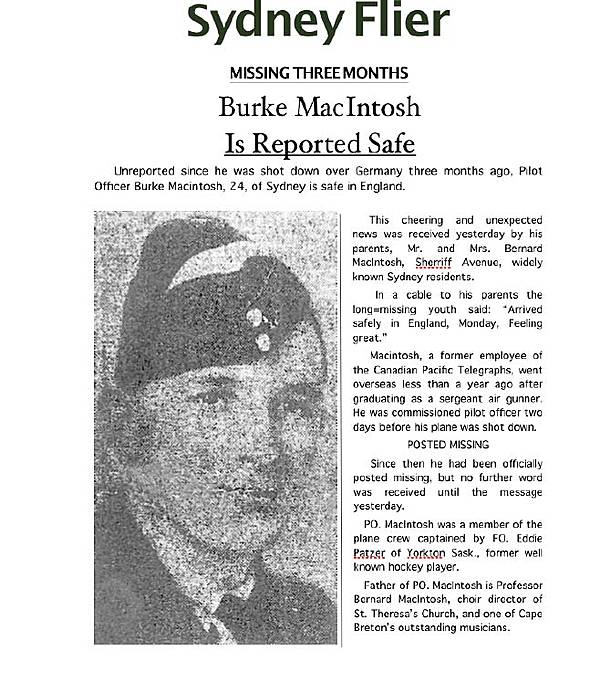
In Flanders Field--Again
In Flanders's Fields again we fight,
And bleed and die, for truth and right.
Once more the poppies nod and bend,
And O'er the winds their fragrance send
Yet still inside the peasants' door
Must want and death stalk ever-more.
Now over the grave of "Joan of Arc"
The shrapnel shrieks, the cannons bark.
While down the lanes in Normandy,
Goes the Stars and Stripes and Liberty.
This march, by some, misunderstood,
Will haste the day of brotherhood.
These boys of ours, now in the fray,
Are vanguards of a better day.
Cut in the mold of worthy sires,
The faith they bear; that wondrous plan,
Is the gospel of the Son of Man.
-A.B. Mendenhall

